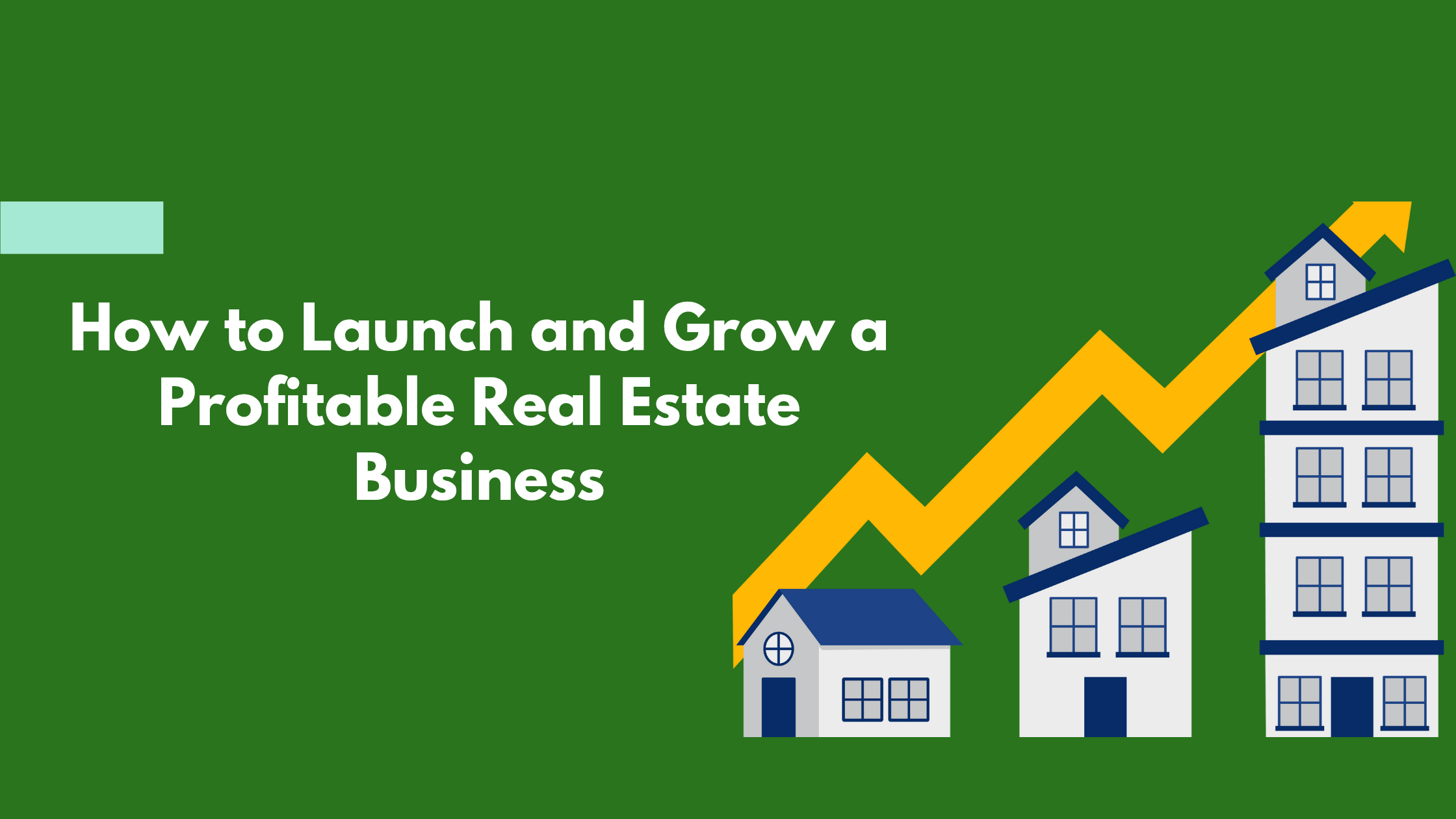Starting a real estate business is exciting. You’ve probably seen realtors closing million-dollar deals, investors flipping houses for massive profits, and landlords collecting passive income from rental properties.
The money looks good, and the opportunities seem endless. But here’s the truth, knowing how to launch and grow a profitable real estate business is not a “get rich quick” scheme. Without a solid plan, it’s easy to get lost in the competition, make costly mistakes, and burn out before seeing any real success.
So how do you actually launch and grow a profitable real estate business? How do you set up a brand that attracts high-paying clients, build a system that generates leads consistently, and scale your business without stretching yourself too thin?
That’s exactly what we’ll cover in this guide. By the time you’re done reading, you’ll have a clear roadmap to turn your real estate ambitions into a thriving business.
Table of Contents
Understanding the Real Estate Market
Jumping into real estate without understanding the market is like playing poker blindfolded. You might get lucky once or twice, but eventually, you’ll lose big. Successful real estate entrepreneurs don’t just sell homes or rent out apartments, they study the market, track trends, and position themselves where the money is flowing.
The first step while doing market research on how to launch and grow a profitable real estate business is picking your niche. Real estate is a massive industry, but not every segment will suit your skills, budget, or long-term vision.
Residential real estate is the most common, involving buying and selling homes for families and individuals. If you’re drawn to larger deals, commercial real estate might be for you, where you lease or sell office spaces, retail locations, or industrial properties. Then there’s real estate investing which involves flipping houses, wholesaling, or holding rental properties for long-term income. Some professionals also focus on property management, handling rental properties for landlords who don’t want to deal with tenants.
Once you choose your niche, you can now dive into market trends. Are home prices rising or falling in your area? Are interest rates high or low? Which neighborhoods are growing, and which are declining?
If you ignore these factors, you risk investing in properties that won’t sell or overpricing your services in a slow market. Staying informed is the difference between a business that thrives and one that struggles.

Setting Up Your Real Estate Business
A lot of people get excited about real estate but fail before they even start because they don’t treat it like a business. If you want to know how to launch and grow a profitable real estate business, you need a legal and professional setup from day one.
Start by registering your business. If you’re working solo, a Limited Liability Company (LLC) offers protection in case of legal issues. If you plan to build a team, a corporation might be a better choice.
Then, get licensed. If you’re becoming an agent, most states require you to take a real estate course and pass an exam before practicing. And don’t forget taxes; hire an accountant who understands real estate so you don’t run into financial problems later.
Now, let’s talk about your online presence. If you don’t have a website for real estate business, you’re already behind. Today’s buyers and investors do their research online first. If they can’t find you, they’ll go to your competitors.
Your real estate services website design should be more than just a digital business card. It should have high-quality listings, a blog that offers valuable insights, and clear contact options for potential clients.
If you’re not sure how to make a website for real estate services, we at Texttot specialize in real estate services website design that helps you attract and convert leads. Let’s help you build a website that brings in clients instead of just sitting there looking pretty.
Building Your Brand and Online Presence
Branding is what makes people remember you. In real estate, trust is everything. If people don’t trust you, they won’t do business with you. Your brand should communicate reliability, expertise, and results.
Start with a professional image. Use a clean, modern logo and a color scheme that reflects professionalism. But branding goes deeper than visuals. What’s your unique selling point? Maybe you specialize in helping first-time homebuyers navigate the process. Maybe you focus on luxury properties. Whatever your specialty, make it clear in your messaging.
Social media is your best friend when it comes to building brand awareness. Instagram is great for showcasing properties through high-quality photos and videos. Facebook lets you run targeted ads to reach buyers and sellers in specific locations. LinkedIn helps you connect with real estate investors, developers, and other professionals. And YouTube is a game-changer if you create content like virtual property tours or market insights. Being active on these platforms keeps your brand visible and helps you attract potential clients organically.
Lead Generation and Client Acquisition to Help Grow a Profitable Real Estate Business
You can have the best brand and the most stunning website, but if you’re not generating leads, your business won’t last. In real estate, leads are everything. Without a steady flow of potential buyers, sellers, or investors, you’ll struggle to close deals consistently.
Traditional marketing methods like flyers, billboards, and networking events still work, but digital marketing is where the real power lies.
SEO helps people find your real estate services website design on Google when searching for properties or agents. Content marketing positions you as an expert through blog posts that answer common real estate questions. Email marketing keeps your audience engaged with property updates and exclusive listings.
Referrals are another goldmine. Happy clients will tell their friends about you, bringing in more business. Stay in touch with past clients, send them useful market updates, and ask for testimonials. A strong referral network can generate leads for years to come.
Mastering Sales and Negotiation
Selling in real estate is more than showing houses and handing over contracts. It’s more about understanding your client’s needs, guiding them through the process, and closing deals that leave everyone happy.
Listening is your superpower. A family looking for their dream home has different needs than an investor looking for rental properties. The more you understand their goals, the better you can position properties that match their needs.
Negotiation is another key skill. You have to strike a balance between getting your client the best deal and making sure the deal actually goes through. If you’re too aggressive, deals can fall apart. If you’re too passive, you’ll leave money on the table. Confidence, preparation, and follow-up are the secret weapons of top real estate professionals.
Managing Finances and Scaling Up
To understand how to launch and grow a profitable real estate business, you must manage your finances properly because that’s what separates a profitable business from one that constantly struggles. If you’re not careful, your money can disappear just as fast as it comes in.
So, track your cash flow. Know how much you’re making, what your expenses are, and where you can reinvest to grow. Hiring a bookkeeper or using financial tools like QuickBooks can keep things organized.
Scaling your business means expanding without overwhelming yourself. When you start hitting your income goals, consider hiring a virtual assistant to handle administrative tasks.
Bring in marketing professionals to help with branding, SEO, and lead generation. Eventually, you might want to hire other agents to expand your team and increase your reach.
Using Technology to Your Advantage
Real estate is evolving, and technology is playing a huge role. With CRM tools, you can track leads, follow-ups, and client interactions so nothing slips through the cracks.
Virtual tours also allow buyers to explore properties from anywhere in the world. AI-powered property valuation tools help you price homes accurately and stay competitive. If you’re not using technology in your real estate business, you’re leaving money on the table.
Final Thoughts
When you think of how to launch and grow a profitable real estate business, remember it is not always easy, but it’s absolutely possible. The key is to treat it like a real business from day one; know your market, build a strong brand, generate leads consistently, and always look for ways to scale.
And if you need help creating a real estate services website design that actually brings in clients, Texttot has you covered. We specialize in building high-converting websites for real estate professionals.


